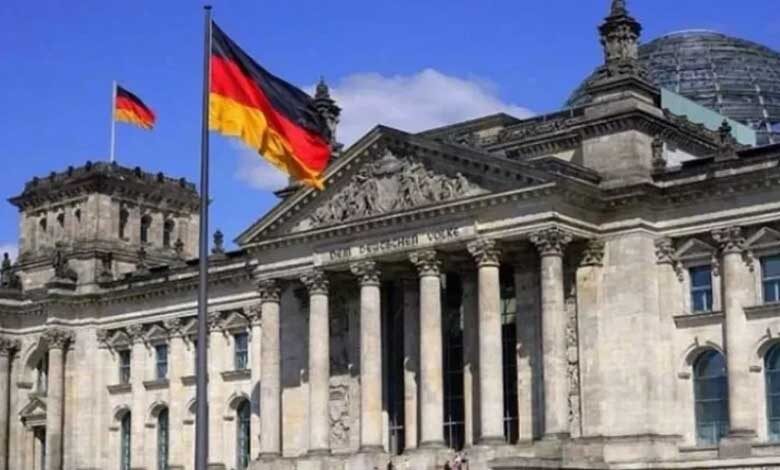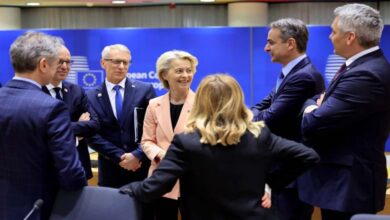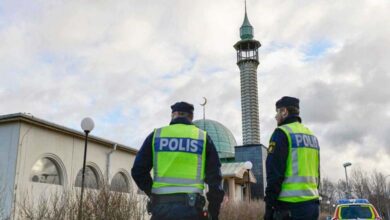A press report reveals details of a bill to blockade the Brotherhood in Germany

The infiltration of the Muslim Brotherhood group, its terrorist ideology and the danger it represents has become a priority for several countries, especially in Europe, amid calls to shed light on the danger of this octopus, after it was perceived as the most dangerous extremist organization in the West.
The danger of the Muslim Brotherhood has prompted European countries to take measures to deter it, to rein in the fingernails of the organization, which is now deceiving its societies and depriving it of the tools of influence. Among these measures are German moves at the federal and state levels, the latest of which was the emergence of a draft resolution that is being studied and discussed in the parliament of the state of North Rhine-Westphalia, the largest German state.
The project, is entitled No. 17/13761 of 2021, under the title: Halting State Cooperation and Financing for Islamist-Influenced Associations and Effectively Countering the Penetration of Political Parties. The Alternative for Germany (Populist) party presented the North Rhine-Westphalia Parliament last May. Discussions in parliamentary committees on the project will be completed by 2 and 16 September.
The draft, based on a position paper prepared by the ruling Christian Union (center-right) last April on confronting the organizations of political Islam in the country, stated: After the CDU’s parliamentary group realized that many Muslim organizations operating in the country are influenced by political Islam, the CDU is now calling for an end to the German authorities’ cooperation with and funding of these organizations.
The draft resolution conveyed the text of the position paper: In the future, all financial donations, subsidies, contractual and cooperative relations with Islamic clubs and associations that are monitored by the Constitutional Protection Authority (Internal Intelligence) must be vetted and stopped at the federal and state levels.
The preamble of the draft resolution also quoted the position paper of the Christian Union, requesting it to draw up plans to establish university chairs on the subject of Islamism, to establish a documentation center for political Islam in Germany and Europe, to launch a group of political Islam experts in the Federal Ministry of the Interior, and to undertake the academic and spiritual training of imams in Germany, and stated that it has been known for years that some university organizations are subject to the influence or penetration of Islamists, citing as an example the Coordinating Council of Islamic Organizations, which was established in 2007 as a platform for the four largest Islamic organizations in Germany, namely the Turkish Islamic Union, the Central Council of Muslims, the Islamic Council and the Association of Islamic Cultural Centers.
The preamble to the project pointed to the existence of personal and institutional links between the Coordination Council of Islamic Organizations, radical Islamists of the Muslim Brotherhood, and other extremist political Islam organizations, explaining that the Brotherhood exerts great influence on the Coordination Council of Islamic Organizations and the Central Council of Muslims. In its 2019 report, the North Rhine-Westphalia Interior Ministry said that Turkey was supporting the Muslim Brotherhood movement… The Central Council of Muslims includes Brotherhood-affiliated associations and organizations, particularly the Organization of the Islamic Community, the main Muslim Brotherhood arm in Germany, the Turkish Attayb organization, and the Turkish Millî Görüş group.
The preamble to the decision pointed out that many political blocs in the North Rhine-Westphalia Parliament do not clearly distance themselves from calculated or Brotherhood-linked organizations, in reference to the penetration of these organizations into the political parties in the state.
To counter these extremist organizations, particularly the Muslim Brotherhood, the draft resolution states that “the Parliament of North Rhine-Westphalia shall call upon the State Government to suspend all cooperation and financing with Islamist-influenced organizations.
The bill also calls on the state parliament to call on the government to stop future collaboration with organizations whose orientations and objectives are incompatible with the free democratic statute, he said, adding that the state parliament is asking the government to establish chairs that deal scientifically with the phenomenon of Islamism in universities, and to conduct broad studies on countering Islamist organizations.
If the parliament of North Rhine-Westphalia passes this bill in the coming months, it will become the first law to confront the Brotherhood and its associated organizations in Germany. Also, adopting this state as the legal basis for the siege of the Brotherhood will be a huge leap in the course of confronting the organization, because this state is the largest and most populated and is a model for the rest of the country, and its current ruler is Armin Laschet, the first candidate to succeed Angela Merkel.
The Brotherhood has a strong presence in Germany, via the Organization of the Islamic Community, and numerous small organizations and mosques throughout the country.
The Constitutional Protection Authority controls the Brotherhood’s institutions and leadership in Germany, classifying them as a threat to constitutional and democratic order.












